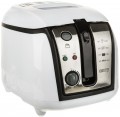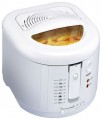cooking t
The cooking temperature provided by the device. Most models are adjustable, so this item indicates the operating temperature range.
Deep frying is carried out at temperatures from 130 to
190 °С200 °С. But
high operating temperatures (over 200°) are less common.
Basket capacity
The capacity of the deep fryer basket or multi-oven bowl, or air fryer flask (see "Type") in kilograms is the maximum amount of food that can be loaded into the device at one time.
For deep fryers used in everyday life, a capacity of up to 0.6 – 0.8 kg is considered quite sufficient; it is rarely useful to fry numerous foods at a time at home. But models that can hold from a kilogram or more are designed mainly for industrial use — in cafes, canteens, etc. In turn, multi-ovens with a capacity of up to 0.8 kg can be called small, up to 1.5 kg — medium, more than 1.5 kg — large. Air fryers have approximately the same capacity.
Volume
The volume of the multi-cooker bowl, deep fryer basket, air fryer container, or the cooking chamber of a multi-oven.
This parameter is measured in liters and is directly related to the capacity of the basket (see above) — larger volumes are required for a greater quantity of food. For deep fryers (see "Type"), this parameter is usually specified not by the total volume but by the amount of oil needed for standard operation, providing an estimate of how much oil is required for the appliance. In models with separate compartments (see below), the volume may be indicated for each section individually.
Timer
The type of timer provided in the design of the device.
The
timer itself is a device for controlling the cooking time: it measures a user-specified period of time and at the end of it gives a signal, and in some models it also stops heating. And the types of such devices can be as follows:
— Mechanical. A basic type of timer commonly found in appliances is a mechanical timer, often in the form of a specialized knob. To set the timer, the knob is turned to the desired time division, and it rotates in the opposite direction, counting down the time. Mechanical timers are known for their simplicity, reliability, and affordability. However, they are not highly accurate, typically allowing time to be set with a precision of one or two minutes. Over time, the knob may become loose, further reducing the accuracy of the timer setting. Nonetheless, for most purposes, this level of accuracy is sufficient.
— Electronic. An electronic timer is set using electronic circuits and is equipped with a display that shows the set time and the countdown. The key advantage of electronic timers is their high accuracy, allowing time to be selected with precision down to the second. However, electronic timers are more complex and expensive compared to mechanical timers.
Power consumption
The power consumed by the device during operation. Usually indicated by the maximum energy consumption, at the most intensive mode of operation.
Large capacity requires more power. However, devices with similar characteristics may differ in this parameter. It is worth noting that, other things being equal, lower power does not mean more economical energy consumption: cooking in such a device takes more time and as a result, the amount of energy spent is almost the same. At the same time, lower power means less load on the electrical grid, which can be important in houses with poor wiring.

